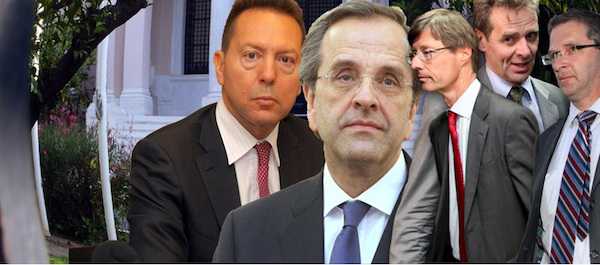
10 34Envoys from Greece’s international lenders will leave Athens on March 14 after talks with the government failed to reach agreement on their demands for public sector layoffs and structural reforms.
Finance Minister Yiannis Stournaras insisted that there was progress and only “technical issues needed to be resolved and that a 2.8 billion loan installment due this month wouldn’t be delayed.
But at the same time he said officials from the Troika of the European Union-International Monetary Fund-European Central Bank (EU-IMF-ECB) won’t return until later this month or in April, which means the loan won’t be forthcoming on time.
Talks between Prime Minister Antonis Samaras and Troika officials lasted only a couple of hours on March 13 before an impasse resulted. Samaras is reluctant to reduce the public workforce that is the main base of voter support for his New Democracy Conservatives and his coalition partners, the PASOK Socialists and the tiny Democratic Left.
The government also wants to give tax debtors more time to make payments and for the Value Added Tax that it raised to 23 percent on Troika orders to be cut back in certain sectors to stimulate growth. The Troika has rejected the ideas and wants an accelerated pace of layoffs of 25,000 workers this year.
Stournaras insisted that the two sides were edging toward a deal and that Greece’s next loan tranche of 2.8 billion euros was not in danger. “There has been significant progress in the talks with the Troika,” Stournaras told journalists after leaving the talks at the Maximos Mansion, in which he also took part, although he didn’t explain how that jibed with their decision to leave without an agreement. “The negotiations will continue when the Troika representatives return. There is no issue with the loan tranche,” he added.
The newspaper Kathimerini also reported that big differences remain on a number of issues, indicating that the government was downplaying the gap and trying to spin the decision by the Troika to leave. Stournaras did not reveal what’s being discussed but it was reported that they include worker layoffs, continuation of a 100 percent property tax surcharge implemented two years ago, tax cheats and employers unlawfully keeping social security contributions that they are supposed to pay into workers pension funds.
Another issue being debated by the two sides is the possibility of bank customers being given more favorable terms to repay their loans and mortgages. Development Minister Costis Hatzidakis indicated there was little progress on this issue as well. Greeks who’ve been hit with 30 percent pay cuts and big tax hikes that have slashed their income by nearly 46 percent are being pressed by banks to repay their loans in full while New Democracy and PASOK aren’t being forced to pay back some 250 million euros ($324 million) in bank loans.
“There is nothing new on the loans issue to come out of tonight’s meeting,” he said.

Leave a Reply